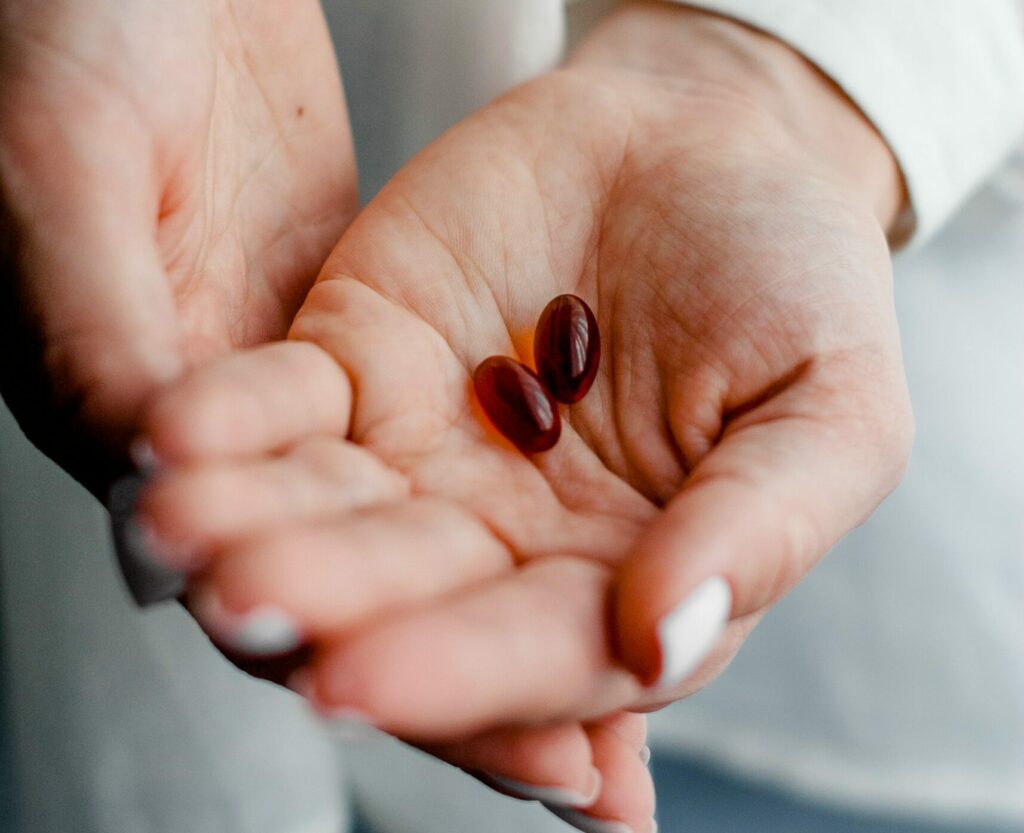If you’re thinking about how to boost fertility in your 30s, then you might be wondering whether the right combination of supplements could be your saving grace. Many of us hear rumours, see ads, or troll reddit threads about the latest supplements that will help us get pregnant. But how do we know what’s true?
We’re here to set the record straight. This article will walk you through the evidence behind 9 of the most common vitamins supplemented for fertility. By the end, you should feel more confident talking to your doctor about what supplements to consider for your fertility.
Firstly, let’s talk about what science says about the effectiveness of supplements for female and male infertility.
Fertility supplements for female infertility
Some studies suggest micronutrients may affect female fertility, but due to limitations in the studies, we cannot make general recommendations. However, no supplement has been proven beyond doubt to increase conception rates amongst infertile women. We also don’t know the value of supplements in assisted conception (i.e. IVF).
A major problem is the make-up of most commercial supplements. A critical review of 24 dietary supplements marketed in Italy for female infertility found that most contain ingredients with poor evidence of efficacy. 30 out of 38 ingredients had no reported efficacy at all for female infertility. Many of the ingredients with positive evidence were dosed under their minimal effective daily dose.
Fertility supplements for male infertility
The current literature suggests that antioxidants positively impact male infertility. Multiple studies have shown a link between men taking certain supplements and significantly increased sperm quality and pregnancy rates.
However, as with women’s fertility supplements, few ingredients in common male fertility supplements have positive evidence in randomized clinical trials. In a systematic review of popular male fertility supplements, just 22% of ingredients had published evidence for improving semen parameters, with only 17% showing a positive effect.

Now, here are the facts on 9 of the most common supplements you’ve been wondering about.
Fertility supplements: Prenatal vitamins (insufficient evidence)
Generally, prenatal vitamins include folic acid and iron. It’s recommended that all reproductive-age women regularly take supplements with optimal amounts of folic acid, starting 2-3 months before conception and throughout pregnancy, until the end of lactation or at least 4-6 weeks post-delivery. So, we often hear the question, do prenatal vitamins make you fertile?
The short answer is, no. Prenatal vitamins are recommended for pregnancy because folic acid helps prevent neural tube defects and other birth defects in your baby, while iron supports placenta and fetus development. You should start taking them before conception because the baby’s neural tube develops in the first month of pregnancy, sometimes before you know you’re pregnant. But there is no proof that prenatal vitamins increase fertility itself. Taking supplements with folic acid is not associated with the probability of clinic pregnancy or live birth.
If you’re a woman of reproductive age and trying to conceive, then you can look for a prenatal vitamin with folic acid, iron, calcium, and vitamin D. Calcium and vitamin D promote the baby’s teeth and bone development. You might also consider one with vitamin C, vitamin A, vitamin E, B vitamins, zinc, and iodine. Make sure to talk to your doctor about dosing, and don’t take more vitamins than advised to avoid harming your baby.
Fertility supplements: Omega-3 (positive evidence)
Omega-3s play an important role in cell structure and formation (including eggs and sperm) and link to positive fertility outcomes for men and women.
For women
Omega-3s may fight age-related female infertility and support healthy egg quality. An American Society for Reproductive Medicine (ASRM) study found women with more omega-3s in their diet more likely to have better ovulatory patterns, with omega-3s positively affecting reproductive hormones including follicle-stimulating hormone (FSH), progesterone, and estrogen. Another study linked higher omega-3 fatty acid consumption with a higher probability of clinical pregnancy and live birth.
For men
Omega-3s have been shown to support sperm count, sperm motility, and sperm morphology.
Wondering how much omega-3 to take for fertility? You’ll have to ask your doctor about the best dose for you, but we can recommend purified fish oil supplements with a high omega-3 concentration.
Fertility supplements: Zinc (positive evidence)
Zinc is a mineral whose antioxidant properties are important to sperm development in men. So, does zinc help with fertility? For men, the answer is yes.
For men
Zinc levels have strong links to increased sperm volume/count and other sperm parameters. Helping to protect sperm from toxin-induced damage, supplementing zinc may improve sperm parameters and low testosterone.
If you’re a man who does not get enough zinc in your diet (from foods like shellfish and beef), it may be worth considering zinc supplements.
Fertility supplements: CoQ10 (positive evidence)
CoQ10 is an important regulator of energy metabolism and helps to protect female gametes from oxidative stress. Research shows positive results for fertility in women and men, but NCCIH argues the research is too limited to be conclusive.
For women
CoQ10 has been found to improve egg quality and pregnancy rates, suggesting it could prevent post-ovulatory aging in infertile women.
For men
CoQ10 supplementation is shown to improve sperm quality. A meta-analysis found that taking 200-300mg of CoQ10 per day significantly improved semen parameters.
We often hear questions like, how long should I take CoQ10 for fertility? How fast does CoQ10 work for fertility? Because sperm develop over 75 days and eggs over 90-120 days, fertility specialists advise taking CoQ10 for 90 days or more for best results.
Another common question is, how much CoQ10 should I take for fertility? Most of us get 3-6mg of CoQ10 per day from diet, largely from meat products. Fertility specialists recommend 100-600mg of CoQ10 daily, but always consult your doctor first.
Fertility supplements: Melatonin (positive evidence)
Found in some fertility supplements, melatonin regulates biological rhythms, reproduction, immune, and metabolic functions. Research shows promising results for women’s fertility. However, does melatonin also affect male fertility? Unfortunately, there is currently no evidence of this.
For women
When supplemented, melatonin had a positive effect on oocyte quality, embryo quality and luteal function, hence indicating that it shows promise for women with infertility.

Fertility supplements: Vitamin D3 (insufficient evidence)
Vitamin D has many physiological autocrine, paracrine, and endocrine functions in the female reproductive system. Vitamin D deficiency has also been implicated in some pregnancy complications such as pre-eclampsia and low birthweight. But if you’re wondering how much vitamin D to take for fertility, the truth is that the impact of vitamin D3 supplementation on women’s fertility remains unknown.
Fertility supplements: Biotin (insufficient evidence)
Biotin is an essential nutrient which, in deficiency or excess, has been shown to impact reproduction and cause teratogenic effects (fetal abnormalities). But does biotin affect fertility? Scientists have yet to establish the effects of biotin in the reproductive tract, so we can’t make any recommendations.
Fertility supplements: Turmeric (insufficient evidence)
Turmeric is a plant historically used to treat various conditions in Ayurveda, as well as in other traditional Indian and Eastern Asian medical systems. Despite its intriguing biological activities, it has low bioavailability when taken orally, meaning not much of it reaches the bloodstream. So, does turmeric affect fertility? The unfortunate answer is that there is currently no conclusive evidence to suggest this.
Fertility supplements: Maca (insufficient evidence)
Maca is a plant growing in the Andes Mountains which has long been used medicinally. For the most part, it is taken orally for male infertility, post-menopause health issues, and improving sexual desire, among other uses. But does maca generally increase fertility in women? However, there is not enough reliable evidence to prove its effectiveness.
If you do decide to try it, taking up to 3g per day for up to 4 months appears to be safe. However, maca extracts may act like estrogen, so avoid them if you have a hormone-sensitive condition such as breast cancer, uterine cancer, ovarian cancer, endometriosis, or uterine fibroids.
Tips for taking fertility supplements
- Take them early. Because sperm and eggs develop over 90 days, fertility specialists generally advise taking fertility supplements for 90 days or more before trying to conceive.
- Read the labels to determine how much to take. Don’t take more than 70%-100% of the daily value (%DV) and be sure to talk to your doctor about what dose is best for you.
- Be aware of potential adverse effects and herb-drug interactions. Talk to your doctor about these.
- Tell your doctor if you’re taking any dietary supplements or herbal remedies.
Conclusion
Current research has shown mixed results on the effectiveness of supplements on fertility, with some nutrients demonstrating positive effects and others not having any serious impact.
If you’re considering taking supplements to improve your fertility, talk to your doctor first. They can advise you on which ones to take, how much to take, and when to take them.
Extra resources
- The Office of Dietary Supplements (ODS) by National Institutes of Health (NIH). Look for dietary supplement fact sheets under Health Information.
- Health Canada regulates natural health products (NHPs) to ensure the products you use are safe, effective and high in quality. Search their database for regulated supplements.
Discover more related blogs from Dr. Tanya Williams Fertility Centre:
Vitamin D Deficiency and its Link to Fertility: What You Need to Know






